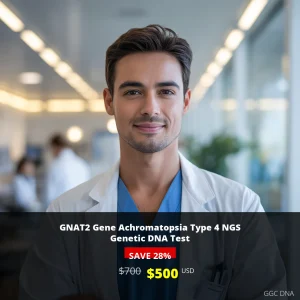PAX6 Gene Coloboma of Optic Nerve NGS Genetic DNA Test
Comprehensive Genetic Testing for Optic Nerve Disorders
The PAX6 Gene Coloboma of Optic Nerve NGS Genetic DNA Test represents a breakthrough in diagnostic ophthalmology, offering precise identification of genetic mutations responsible for congenital eye abnormalities. This advanced genetic analysis utilizes next-generation sequencing technology to examine the PAX6 gene, which plays a critical role in eye development and function. Understanding the genetic basis of optic nerve coloboma provides invaluable insights for patients, families, and healthcare providers in managing vision health and planning appropriate interventions.
What Does This Test Measure and Detect?
This comprehensive genetic test specifically targets mutations within the PAX6 gene, a master regulatory gene essential for proper eye formation during embryonic development. The test detects:
- Point mutations, deletions, and insertions in the PAX6 gene
- Genetic variants associated with optic nerve coloboma
- Mutations linked to congenital eye malformations
- Inherited genetic patterns affecting vision development
- Specific genetic markers for optic nerve defects
Who Should Consider This Genetic Test?
This test is particularly recommended for individuals experiencing:
- Congenital optic nerve abnormalities or coloboma
- Unexplained vision impairment from birth
- Family history of inherited eye disorders
- Multiple congenital eye abnormalities
- Suspected genetic syndromes affecting vision
- Children with developmental eye conditions
- Individuals planning pregnancy with family history of eye disorders
Key Benefits of PAX6 Genetic Testing
Undergoing this comprehensive genetic analysis provides numerous advantages:
- Accurate Diagnosis: Precise identification of the genetic cause of optic nerve disorders
- Family Planning Guidance: Information about inheritance patterns and recurrence risks
- Personalized Treatment: Tailored management strategies based on genetic findings
- Early Intervention: Opportunity for proactive vision care and monitoring
- Genetic Counseling: Professional guidance for understanding test results and implications
- Peace of Mind: Clarity about genetic status and family health risks
Understanding Your Test Results
Our comprehensive genetic counseling service helps you interpret your results effectively:
- Positive Result: Indicates the presence of PAX6 gene mutation associated with optic nerve coloboma
- Negative Result: Suggests no detectable mutation in the PAX6 gene analyzed
- Variant of Uncertain Significance: Requires further evaluation and family studies
- Carrier Status: Information about inheritance patterns and family risk assessment
All results are accompanied by detailed explanations from our certified genetic counselors, ensuring you fully understand the implications for your health and family planning decisions.
Test Pricing and Details
| Test Feature | Details |
|---|---|
| Test Name | PAX6 Gene Coloboma of Optic Nerve NGS Genetic DNA Test |
| Discount Price | $500 USD |
| Regular Price | $700 USD |
| Turnaround Time | 3 to 4 Weeks |
| Sample Type | Blood, Extracted DNA, or One Drop Blood on FTA Card |
| Methodology | Next-Generation Sequencing (NGS) Technology |
Pre-Test Requirements
To ensure optimal testing accuracy and comprehensive analysis, we require:
- Complete clinical history of the patient
- Genetic counseling session with our certified specialists
- Detailed pedigree chart of family members affected by eye disorders
- Documentation of previous ophthalmological evaluations
Nationwide Accessibility
We proudly serve patients across the United States with convenient testing locations in all major cities including New York, Los Angeles, Chicago, Houston, Phoenix, Philadelphia, San Antonio, San Diego, Dallas, San Jose, and many more. Our network of certified collection centers ensures easy access to this advanced genetic testing service.
Take Control of Your Vision Health Today
Don’t let uncertainty about genetic eye conditions affect your quality of life. Our comprehensive PAX6 genetic testing provides the clarity and information you need to make informed decisions about your vision health and family planning. With advanced NGS technology and expert genetic counseling, we deliver reliable results you can trust.
Call us now at +1(267) 388-9828 to schedule your genetic counseling session and book your PAX6 Gene Coloboma of Optic Nerve NGS Genetic DNA Test. Our dedicated team is ready to assist you with compassionate care and professional expertise.






